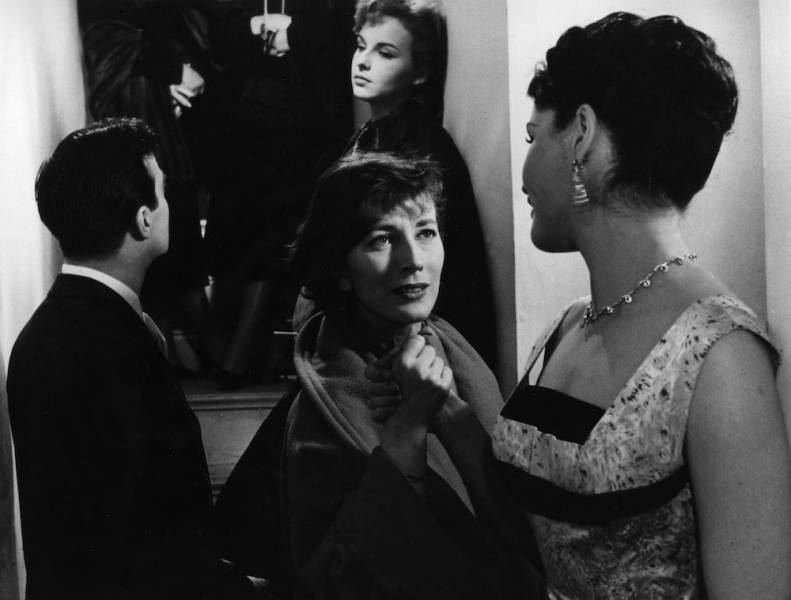All the Best of Titanus at the Film Society of Lincoln Center
What do films like "Le Amiche" by Michelangelo Antonioni, "The Bird" with the Crystal Plumage / L’uccello dalle piume di cristallo by Dario Argento, Totò Diabolicus by Steno and Two Women / "La Ciociara" by Vittorio De Sica have in common? They were all produced by the Italian film studio Titanus, also known as “the Italian MGM.”
Starting on May 22, and ending on the 31, the Film Society of Lincoln Center presents an all-Italian film series: Titanus, A Family Chronicle of Italian Cinema.
Featuring works by filmmakers like Federico Fellini, Vittorio De Seta, Michelangelo Antonioni, Ermanno Olmi, Dario Argento, Vittorio De Sica, and Mario Monicelli, among others, the series focuses mainly on the films produced at Titanus from the late ’40s to the early ’60s, when the studio was arguably at its best.
The Titanus retrospective was launched at last year’s Locarno Film Festival, and following the presentation at the Film Society of Lincoln Center, it is then set to travel to the American Cinematheque and the USC School of Cinematic Arts in Los Angeles.
Organized by Isa Cucinotta and Dennis Lim for the Film Society of Lincoln Center, the program was selected from the Titanus retrospective curated by Roberto Turigliatto and Sergio M. Germani at the 2014 Locarno Film Festival, organized in collaboration with the Cineteca di Bologna, the Centro Sperimentale di Cinematografia – Cineteca Nazionale (National Film Archive), the Istituto Luce Cinecittà, and the Cinémathèque suisse in Lausanne.
“Titanus, which was the equivalent of Metro-Goldwyn-Mayer and 20th Century Fox—studios with whom Titanus co-produced several films in the 1960s,” representatives of the Film Society have declared.
“Was responsible for early works by Antonioni, Argento, De Sica, Fellini, and Luchino Visconti, as well as provided a production home for a number of other notable directors, including Mario Bava, Giorgio Bianchi, Luigi Comencini, Vittorio De Seta, Riccardo Freda, Alberto Lattuada, Camillo Mastrocinque, Ermanno Olmi, Brunello Rondi, Francesco Rosi, and Agusto Tretti. During that time, the studio was noted for a robust combination of lowbrow comedies and sword-and-sandal epics, which would later be deemed classics.”
Founded in 1904 by Gustavo Lombardo and run by him until his death in 1951, when his son Goffredo took over, Titanus remains in the family to this day, but its glorious days definitely were the first 15 years of Goffredo’s administration, “a time when soul-searching works by Fellini and Antonioni alternated with gruesome fright fests by Argento and Mario Bava, and transatlantic co-productions occurred long before they were common.”
Among the selection of famous classics and lesser known films, there are many different gems, including Vittorio De Sica’s Two Women (1960), for which Sofia Loren won an Academy Award for her heartbreaking portrayal of a widow struggling to survive with her daughter in World War II, Dario Argento’s The Bird with the Crystal Plumage (1970) starring Tony Musante as an American writer who witnesses a knife attack on a woman and gets caught up in an investigation to find the culprit, Michelangelo Antonioni’s Le Amiche (1955), an adaptation by the filmmaker himself of Cesare Pavese’s novella Among Women Only, the story of a young woman who returns to her native Turin to set up a new fashion salon which won the Silver Bear at the Venice Film Festival and Giuseppe De Santis, Mario Serandrei, Marcello Pagliero & Luchino Visconti's Days of Glory (1945), a documentary, rarely screened in the U.S., which captures the German occupation of Rome and the Italian resistance in World War II.
Screenings will take place at the Walter Reade Theater (165 West 65th Street).








































i-Italy
Facebook
Google+
This work may not be reproduced, in whole or in part, without prior written permission.
Questo lavoro non può essere riprodotto, in tutto o in parte, senza permesso scritto.